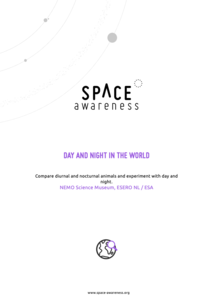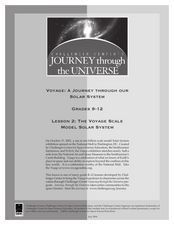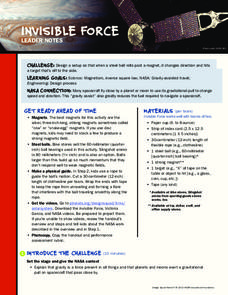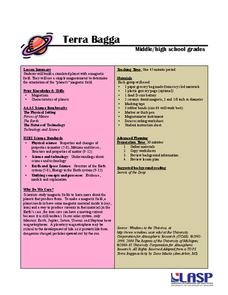Curated OER
Blast Off with Model Rockets
Learners investigate science and math by building a rocket. In this geometry lesson, students build a rocket using paper towel tubes while investigating questions about launching a rocket. They discuss balance and unique structure as...
Curated OER
Pioneers of Space
Students explore how to use natural resources in the next millenium. Students create a KWL chart and then research information on our solar systsem, natural resources, and environments. Students build a model of a future community and...
Space Awareness
Making A Sundial
Can people really measure time just by using the sun? Scholars venture outside on a nice, sunny day to build sundials and learn how people measured time 600 years ago. The class builds two different sundials while gaining practice with...
Space Awareness
Day and Night in the World
How do different parts of the world experience day and night? Introduce scholars to the concept of global citizenship while teaching about animal behavior with discussion of nocturnal and diurnal animals. Then, learners complete...
Curated OER
The Voyage Scale
Students identify how models are powerful tools of exploration and that the sizes of the planets and distances between the planets in the Solar System span a large range. They make a sign for each planet they have created in the...
Space Awareness
History of the Universe
Your pupils may believe that you and their parents are the oldest things in the universe, but surprise! There are elements of the universe that are even older. Elementary scientists create a class timeline to demonstrate the...
Curated OER
Cosmic Wheels
Learners build a scale model of the Solar System and determine the time other planets take to travel around the Sun in comparison to the time of the Earth's revolution. The velocity of the planets are also determined in this lesson.
Curated OER
Walk a Mile in your Orbit
Students create an awareness of the distance between the planets and the complexity of the solar system through a model of an active solar system. they incorporate physical education and math with the ability to convert distances of each...
Curated OER
Deep Impact's Comet on a Stick!
Learners create a model of a comet. In this space science lesson, students compare their model to the characteristics of a real comet. They evaluate and make necessary modifications to their original design.
Curated OER
Distance in Space
Sixth graders explore space science by measuring distances between planets. For this solar system lesson, 6th graders view a Bill Nye video and discover the conversion between the metric system and imperial measuring systems. Students...
Starry Night Education
Comets and Meteors
Comets are also known as dirty snowballs or icy mud balls. With your super scientists, create a model comet nucleus to discover how they are made and take part in a scientific discussion to learn how it behaves.
PBS
Invisible Force
Investigate invisible forces. Young engineers design a setup that changes the direction of a steel ball using a magnetic force. The purpose of the setup is to model the gravitational pull of spacecraft by planetary bodies.
Curated OER
Clay Planets
Students create scale models of the planets out of clay and compare them to the real planets.
Chicago Botanic Garden
What Can Tree Rings Tell Us About Climate?
Tree rings are slightly thicker on the south side of the tree because it receives more sunlight. Part two in a series of five lessons helps learners analyze tree rings to determine the environmental conditions that caused size...
Curated OER
Solar Cars
Students research the causes and effects of air pollution. Using the internet, they examine the specific effects of carbon dioxide on the environment and discover the benefits of using solar power. In groups, they build a model of a...
Curated OER
Sundials and Shadows - What Can They Teach Us About Seasons?
Students collect and analyze data relating to seasonal changes. They view a video, research web sites and build a sundial to collect their data.
Curated OER
Astronomy Teamwork
Students work together in groups to complete an astronomy project. In the classroom, they find real objects to represent various objects in the solar system. After going outside, they practice using a distance scale and use their...
Curated OER
Two Views of the Universe
Students build the two models of the universe created by Aristotle and Copernicus. They compare and contrast the two universes. They create hypothesis on how each model functions.
Curated OER
Scientist Tracking Network
Students correlate surface radiation with mean surface temperature of several geographic regions. They observe how these parameters change with latitude and construct an understanding of the relationship of solar radiation to seasonal...
Curated OER
Planet Paths: Studying Planetary Orbital Paths
Middle schoolers define and identify planetary orbit, ellipse, parabola, and hyperbola, and simulate Kepler's Second Law. They explore interactive websites demonstrating orbital motion and complete modeling activities.
University of Colorado
Terra Bagga
One way to identify possible volcanic activity on other planets is by testing the planet for magnetism. A science lesson begins with pupils constructing their own planet from a dead battery, magnets, paper, and tape before labeling...
University of Colorado
Terra Bagga
Earth's magnetic poles switch positions about every 200,000—300,000 years. In the activity, groups create a planet with a magnetic field. Once made, they use a magnetometer to determine the orientation of the planet's magnetic field....
Curated OER
Alternative Energy
Students discover types of energy. In this physics lesson, students discuss ways to power a car a design a model car kit with an alternative form of energy.
Curated OER
Map Your House
Students are introduced to the concepts of maps as scale models of the whole. After a brief lecture on creating and using an accurate scale when drawing and reading a map. They create a scale drawing of the floorplan of their homes.

























